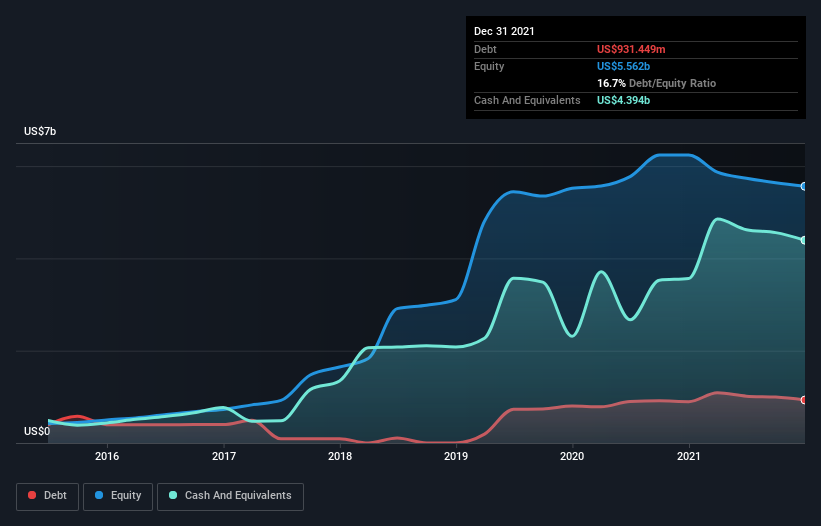Is JOYY (NASDAQ:YY) A Risky Investment?
Howard Marks put it nicely when he said that, rather than worrying about share price volatility, 'The possibility of permanent loss is the risk I worry about... and every practical investor I know worries about.' So it seems the smart money knows that debt - which is usually involved in bankruptcies - is a very important factor, when you assess how risky a company is. As with many other companies JOYY Inc. (NASDAQ:YY) makes use of debt. But the more important question is: how much risk is that debt creating?
Why Does Debt Bring Risk?
Debt is a tool to help businesses grow, but if a business is incapable of paying off its lenders, then it exists at their mercy. Ultimately, if the company can't fulfill its legal obligations to repay debt, shareholders could walk away with nothing. While that is not too common, we often do see indebted companies permanently diluting shareholders because lenders force them to raise capital at a distressed price. Of course, the upside of debt is that it often represents cheap capital, especially when it replaces dilution in a company with the ability to reinvest at high rates of return. The first thing to do when considering how much debt a business uses is to look at its cash and debt together.
See our latest analysis for JOYY
How Much Debt Does JOYY Carry?
The chart below, which you can click on for greater detail, shows that JOYY had US$931.4m in debt in December 2021; about the same as the year before. But on the other hand it also has US$4.39b in cash, leading to a US$3.46b net cash position.
How Strong Is JOYY's Balance Sheet?
The latest balance sheet data shows that JOYY had liabilities of US$2.51b due within a year, and liabilities of US$1.05b falling due after that. On the other hand, it had cash of US$4.39b and US$283.9m worth of receivables due within a year. So it actually has US$1.12b more liquid assets than total liabilities.
This surplus liquidity suggests that JOYY's balance sheet could take a hit just as well as Homer Simpson's head can take a punch. With this in mind one could posit that its balance sheet means the company is able to handle some adversity. Simply put, the fact that JOYY has more cash than debt is arguably a good indication that it can manage its debt safely. There's no doubt that we learn most about debt from the balance sheet. But it is future earnings, more than anything, that will determine JOYY's ability to maintain a healthy balance sheet going forward. So if you're focused on the future you can check out this free report showing analyst profit forecasts.
Over 12 months, JOYY reported revenue of US$2.6b, which is a gain of 37%, although it did not report any earnings before interest and tax. Shareholders probably have their fingers crossed that it can grow its way to profits.
So How Risky Is JOYY?
Although JOYY had an earnings before interest and tax (EBIT) loss over the last twelve months, it generated positive free cash flow of US$26m. So taking that on face value, and considering the net cash situation, we don't think that the stock is too risky in the near term. We think its revenue growth of 37% is a good sign. We'd see further strong growth as an optimistic indication. There's no doubt that we learn most about debt from the balance sheet. However, not all investment risk resides within the balance sheet - far from it. These risks can be hard to spot. Every company has them, and we've spotted 2 warning signs for JOYY (of which 1 shouldn't be ignored!) you should know about.
If you're interested in investing in businesses that can grow profits without the burden of debt, then check out this free list of growing businesses that have net cash on the balance sheet.
Have feedback on this article? Concerned about the content? Get in touch with us directly. Alternatively, email editorial-team (at) simplywallst.com.
This article by Simply Wall St is general in nature. We provide commentary based on historical data and analyst forecasts only using an unbiased methodology and our articles are not intended to be financial advice. It does not constitute a recommendation to buy or sell any stock, and does not take account of your objectives, or your financial situation. We aim to bring you long-term focused analysis driven by fundamental data. Note that our analysis may not factor in the latest price-sensitive company announcements or qualitative material. Simply Wall St has no position in any stocks mentioned.

